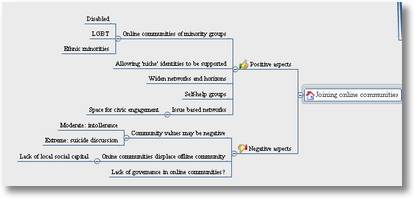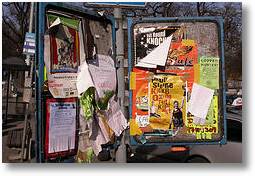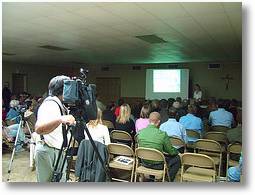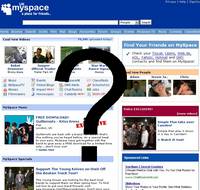
Over on the BarCampUKGovWeb discussion list Ian Dunmore shared a question posted today on the Public Sector Forums:
“I've been asked by a couple of people in my council if they can use the
likes of Bebo and Facebook to add a group to, to encourage young people to engage with the council. Firstly, it's Libraries and secondly our youth
people who want to promote a youth portal that is being developed.”
In my reading for the Youth Work and Social Networking research I'm currently involved in, and in trying to prepare a series of briefing papers on Social Networking Sites I've been struck by how complicated an issue this turns out to be.
The answer depends on (at the very least):
-
Which Social Networking Site you are talking about
-
What you want to do through the Social Networking Site
-
What position you take with regards to certain examples of offline engagement with young people – that is, what professional judgments have you already made that you need to be consistent with online. (This isn't just about questioning the way we should interact online – it's about questioning some of the ways we interact with young people in general).
 And the answer to the straight question of 'Should our local authority be on my space of Facebook?' turns out to be a very qualified definitely maybe.
And the answer to the straight question of 'Should our local authority be on my space of Facebook?' turns out to be a very qualified definitely maybe.
Some thought experiments and arguments by analogy may prove useful in exploring professional intuitions and sensible responses to Social Networking Sites. The following thought experiments are very provisional and under-developed at present – but I offer them in the hope they can in some way help further the discussions taking place…
Which social networking site?
What the community, norms and expectations in a particular Social Networking Site community are matter.
MySpace is visibly highly commercialized and seemingly chaotic. Think of it like a very commercial music festival. If your local authority were to set up a stall there to hand out leaflets, chances are you could be next to a stall selling occult looking statues and drug taking paraphernalia.
-
Would you be comfortable in this space?
-
If 20% of the young people you needed to reach with your message were there – should you get over any discomfort and be there?
-
What if 80% of the young people you need to reach will be there?
-
What if the festival has an area that is for over 18's only – but you know that all the young people you need to reach (who are under 18) are actually in that area? Would you go and set up your stall there? Should you? What are the issues in play?

(Caveat: Most festivals are temporary – so you might think 'we don't need to be there -we'll catch people at another time in the year'. The my space festival is year-round, 24-7. Does that change things?)

FaceBook gives (at least) the illusion of a more ordered environment where setting up a Facebook page or group for your organization may perhaps seem like setting up and inviting people to join a community forum, with the added benefit that when they join the forum – all their friends are told about it. But any community forum needs facilitation and resourcing, and there is an expectation of meaningful dialogue. And on Facebook you're competing with many other groups and communities.
- Do you have the resources to facilitate the sort of dialogue you want?
- Are your expectations of return on investment reasonable given the competition in this space? What is a viable return on investment?
- Is it enough to offer people to chance to sign as members of a 'community panel' if they only get invited to input once or twice a year?
- Can you afford not to offer people in this space the opportunity to get involved in dialogue with you?
Bebo… well, I've not had an in depth look at Bebo yet – and I realist the Facebook analogy above also needs more work… so I'll come back to these soon.
What do you want to do?
What you're planning to do, and how you do it matters.
You might want to use a Social Networking Site to:
- Promote something that is going on.
- Provide important information, advice and guidance to young people.
- Engage in collective civic conversation and dialogue with young people.
- Build a mailing list of people you can contact.
You might think of (1) as like putting up a virtual poster, or running an advert.
 Q: If 60% of your target population for an activity or project are going to a particular space, and you can advertise there for free… would you do it? What would you have to think about in making that decision?
Q: If 60% of your target population for an activity or project are going to a particular space, and you can advertise there for free… would you do it? What would you have to think about in making that decision?
You might think of (2) as setting up a one-stop information and advice shop in the town centre. Only, in this town centre exists online globally.
Q: If someone is already providing good general information advice and guidance – what is the unique additional offer you can bring?
Social Networking Sites can often create an expectation of dialogue and can be an effective platform for dialogue and discussion (3).
Setting up a space where you ask questions, but are not actively joining the discussion and providing answers, asking further questions, or showing evidence of change would be like holding a meeting where you invite young people to offer their views on a topic, and then sitting there in silence until everyone eventually goes home.
 Joining a group on a Social Networking Site is a very quick action. Groups can have a far better 'sign up' rate that an e-mail newsletter might (4). And the informal quick message to group members may be received better than the carefully edited and formatted eat-mailing. But a group is also usually a space for dialogue.
Joining a group on a Social Networking Site is a very quick action. Groups can have a far better 'sign up' rate that an e-mail newsletter might (4). And the informal quick message to group members may be received better than the carefully edited and formatted eat-mailing. But a group is also usually a space for dialogue.
Q: If you've not got capacity to manage the dialogue – can you be honest about that? If you can host dialogues, but only in one place which isn't on this particular SNS, should you be setting up an 'outpost' on this particular SNS to periodically point people to your main discussion spaces?
From years of running consultations with young people – I'm also well aware of 'the suit question'. Meeting with young people – should you wear a suit? It shows respect – but it's not accessible. But then – should you try and dress 'cool'? Probably not. So how should you act? What image should you present? What image will your SNS space present?*
(*Hint: get young people involved in helping you create it.)
What are your pre-existing professional intuitions?
 Question your hesitancy. Understand your reasons. Check against your aim and mission.
Question your hesitancy. Understand your reasons. Check against your aim and mission.
The thought experiments above may cause hesitancy about engaging with Social Networking Sites. My hope is that hesitancy helps in thinking through how to engage well, rather than blocks any engagement at all.
As Dave Briggs puts it:
There are masses of good reasons for engaging with these platforms, for
example the fact that they are already being used by the young people in question, and we aren't asking them to sign up for some new Council (or otherwise) sponsored affair that is bound to be considered gaff.
And so we definitely need to spend more time thinking about this…
Creative Commons Photos:
Are they allowed to sign up on Facebook?! I thought they were quite strict on there about insisting you’re a ‘real person’.
In any case the answer for me is a simple no. Both are social networking sites – do I want to socially network with my council? No!!
What I do want is to know where to get info to get my bins collected, how to contact the right people to see when the sports centre is open, how to complain about the rubbish dumped down the lane etc. etc. For this what I want is to type in the local authority into google – go to their website and then easily find the information I want. I don’t want to network with them – thats not why I pay council tax. So my opinion is they should focus their efforts on making their own sites useful and usable (many aren’t).
Should my councillor be on facebook? Yes if they feel that will help them reach more people – and so this could apply to members of the Youth Parliament & so on. If I don’t get what I want these are the people I turn to and my experience has been they’re usually very helpful – so yes to people on social networks & no to local authorities who should spend their time getting their house in order (or website!)
Facebook now allows organisations to have pages which operate a little like groups, and a little like individual profiles (you can add applications to them, people can become ‘fans’ and can then be sent updates by the page owners).
There is no suggestion here that a council should try to ‘be your friend’ on an SNS (although the architecture of some SNS may make using a friends list connection on of the best ways to be present) – but I think it is worth exploring how the provide information in the social space, and make themselves available should you want to interact with them.
Back into analogy: because the sports centre, or the pub, are social spaces – would you object to the local authority putting up a poster to let you know about opportunities coming up to influence the local plan?
You may be very information literate, aware of what you want to find, and able to turn to Google. Others are not. In the same way – some know how to go to the Local Authority Offices to look up planning information – but that doesn’t mean the local authority shouldn’t put up dispalys about upcoming planning applications nearer where you live so more people can find out about it.
Should the local authority focus on SNS sites to the exclusion of their own websites? Definitely not. In fact – their own sites need to be built to have the capacity to integrate with SNS (e.g. RSS feeds into facebook pages, widgets to check planning applications etc.) – and to still be the ‘base’ from which authoritative council content is delivered.
yep I realised after we have a group on Facebook!! :-/
The poster arguments a really good one – on the one hand yes that justifies the use of networks as a ‘billboard’ – on the otherhand I think but this will take more to manage than just putting up posters and is that how I want people in local authorities to spend their time? But then I think well arguably people could graffiti posters – the difference here is that the ‘graffiti’ wold be in one place & so could be useful!
In terms of limited resources though I definitely think the first priority for local authorities should be to get their own sits in order. After this then they should spread the word and encourage people to use their site and do so by any means including the use of social networks – what I wouldn’t be happy with is finding that somebody was employed to do nothing much other than manage their social network profiles!
I worked with somebody who spent a lot of time on myspace/bebo/facebook/msn giving the impression that they were supporting our users & volunteers by doing this – I didn’t find this credible – largely because people are using those sites as ‘recreation’ – the real work we did with those people was face to face, by phone and by email. The problem with social networks is they can easily drain your time and for little productive gain – of course this doesn’t matter at all on a personal level – but when you’re paid to perform a duty I’m not sure the time spent involved with them is worth it.
I think the thing about being ‘information literate’ is very relevant too – with this in mind should local authorities be designing sites for people that are not information literate or educating them to become so? And if so is the use of social network sites able to help towards this? lol so now I’m confused too!!
Hi Tim
quick point. Think of ‘being on other sites’ including SN sites or Wikipedia or a lot of other very obvious sites not as ‘billboard’ but extending your web presence. A point of contact to point to other points or just one. Not everyone comes in through the front door. A smart way to increase your PageRank. Etc.
One of the major reasons for bad findability is simply lack of web presence. You don’t need to put the cart before the horse (developed SN strategy) before adding yourself to important websites.
Cheers
facebook is horrible, I honestly wish it never excisted. Speaking on behalf of teenage culture, it gives them a stronger view of conformity. Don;t you miss the days when you weren’t completely exposed ? when you didn’t have to brouadcast yourself in the way that you would like others to see you by taking good pictures and pretending that you are famous ? people in the days that were prefacebook survied fine socially and in my personal opinion, expirienced less pressure and more curiousity and more personal relationships with the people that they were actually interested in having relationships with, instead of the massive web of people in their lives dating down to elementay school (some that they don’t even want to know or see again). We are basically giving people permission to act nosey and look into our lives, which can be enjoyable but is seriously a waste of time if you think about it. FACEBOOK SUCKS !!! and I know that I sound selfrightous,annoying,and antisocial, but I have had facebook for quite a while and have begin to realise that it has only made me more insecure and addicted to something so empty.I;m so tired of this and need to express my opinion. If you think about, facebook is manly a teenage glorified website, and my generation are getting worse in terms of being self absorbed and basing life on ignorant gossip. well, if anyone sees this and remotely understands, comments are appreciated 🙂